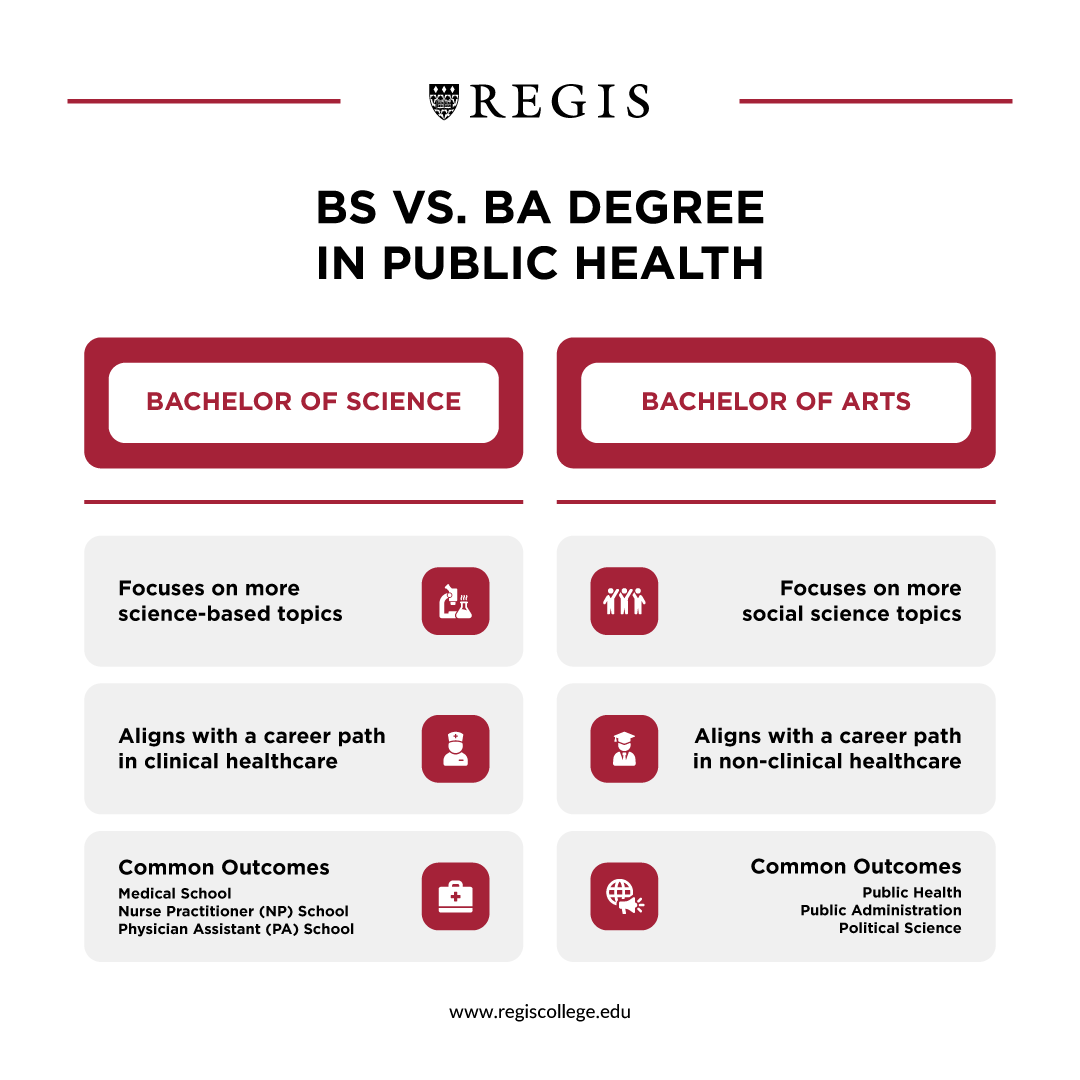Choosing a bachelor's program that aligns with your career aspirations can be daunting—especially with the numerous options available to you. And while many bachelor’s degrees can differ in terms of curriculum and value, this is not the case when earning a bachelor’s degree in Public Health. There are only minor differences between a Bachelor of Arts (BA) and a Bachelor of Science (BS) in Public Health.
So why choose different programs if the core focus is the same? If you take a closer look, there are a few notable differences when it comes to career aspirations.
This doesn’t mean that these degrees offer different levels of qualification; rather, they set you up for slightly different paths, depending on your career goals.
What Is a Public Health Degree?
A public health degree focuses on protecting and improving the health of communities through education, promotion of healthy lifestyles, and research for disease and injury prevention. This type of education can lead to career opportunities that focus on promoting and protecting the health of people and the communities they live in.
To better understand the different facets of this field, here are the five Ps of public health:
- Population-based
- Prevention
- Promotion
- Protection
- Preparedness
Both a BS and BA in Public Health are viable degree options that can pave the way to a rewarding career in the field. However, recognizing the subtle distinctions between them can help align your academic path with your professional dreams.
BS vs. BA in Public Health: Key Differences
If you’re passionate about making a difference in community health and safety, it is important to know how a Bachelor of Science or Bachelor of Arts can help you meaningfully contribute to public health.

Bachelor of Science
A BS in public health tends to have a curriculum that is more focused on science-based materials. This means that prospective students who know they want to pursue a clinical, graduate-level education or advanced public health degree later on are more likely to apply for this program.
Some examples of these graduate paths are:
- Medical school
- Nurse Practitioner (NP) school
- Physician Assistant (PA) school
As a result, students who have completed a BS in public health are more aligned with a career path in clinical healthcare. This doesn’t mean, however, that a BS in public health only leads to one kind of career path; rather, it means the science-focused coursework better prepares you for a position in a clinical setting.
Bachelor of Arts
A BA in public health program has a greater emphasis on social sciences, rather than hard sciences. Students still need to take technical courses like statistics, but are offered other courses that may not necessarily be required for a bachelor of science degree.
Because of this, students who pursue a BA in public health aren’t as likely to enter the workforce in clinical or research positions.
Instead, these public health professionals tend to obtain positions in:
- Public health
- Health administration
- Political science
A BA in public health can still prepare you for graduate-level education like medical school, but you may not have all the prerequisites needed to apply.
Even with these slight differences, prospective students shouldn’t be dissuaded from applying to either program. Most employers seeking bachelor’s-level workers will view either degree favorably, as will graduate programs.
Public Health vs. Clinical Health Professions
When exploring the differences between a BS and BA in public health, the larger question of career paths emerges. Even though these degrees are both excellent programs for applicants who want to pursue a career in public health, bachelor's degree graduates need to decide between two types of career paths: public health vs. clinical health roles.
Public Health Career Paths
If you have a passion for improving the well-being of individuals in your community, but don’t necessarily want to serve patients in a direct, clinical capacity, a career in public health is the right path for you. This offers opportunities to educate members of the public on health-related issues and focuses more on research and development, rather than direct patient care.
Here are a few positions you can consider if you are interested in a public health career:
- Healthcare Administrator
- Public Health Advisor
- Public Health Administrator
- Public Health Policy Analyst
- Health Educator
- Community Health Coordinator
- Community Health Worker
Clinical Health Career Paths
Clinical healthcare positions are well-suited for those who prefer interacting with patients and having a more hands-on role with peoples’ health. It is important to note that while a BA or BS fulfills the minimum educational requirements for most of the positions listed above, this list of clinical healthcare positions require additional education—and even residencies in some cases.
Keep this in mind when considering roles in a clinical setting, including:
- Medical Doctor
- Nurse Practitioner
- Physician’s Assistant
- Occupational Therapist
- Physical Therapist
- Epidemiologist
While each degree type positions you for various careers, it is important to note that prospective employers are not likely to pay attention to whether you received a BA or BS in public health.
Just make sure you have the education and training required for whatever specialization you choose in the field.
Is a Bachelor's in Public Health Worth It?
A bachelor's degree in public health is becoming increasingly valuable due to the growing demand for professionals who can address complex public health challenges.
According to the U.S. Bureau of Labor Statistics, employment in healthcare occupations is expected to grow much faster than the national average from 2022 to 2032. One factor that has undoubtedly contributed to this projected growth is the pandemic and the resulting need for public health professionals who can effectively manage health crises, promote disease prevention, and improve policy responses.
To ensure you are prepared for these roles, bachelor’s degree programs in public health aim to develop valuable skills that are applicable in several healthcare settings. In addition, the degree is a foundational step for advanced studies and career advancement in health-related fields, which offers numerous pathways to making meaningful contributions to public health and safety.
Next Steps to Entering the Public Health Field
Completing your bachelor’s degree in public health sets you up for a fulfilling career—whether it’s a BS or BA. Prospective students should avoid getting caught up on the semantics of these degrees and instead take a closer look at what they want to achieve after graduation.
Are you looking to immediately enter the public health field or attend medical school and complete several years of residencies?
No matter what path you choose, you will be well-equipped to navigate the diverse opportunities in public health and make informed decisions about your future career. The direction you choose will lay the groundwork for a meaningful impact in the field of public health.





